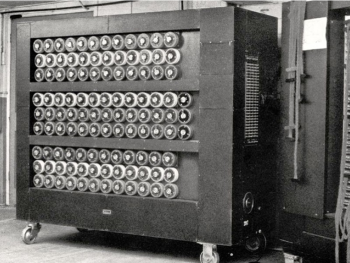
Posted December 29, 2023
By Ray Blanco
The 21st Century Imitation Game
The Enigma machine that the Nazis used to pass coded messages during World War II was a technical marvel of its time.
Every day a new and impossibly complicated cipher was set by German command that was used to send messages that could only be encrypted and deciphered using the appropriately named Enigma machine’s many rotors and electrical pathways.
Using three rotors from a set of five, with each rotor having 26 notches for each letter of the alphabet, there were potentially over 100 trillion possible settings. Traditional decryption methods would take decades, if not centuries, to break the code.
A code that changed its cipher every single day…
The Nazi’s unbreakable code allowed them to carry out U-boat and ground attacks quickly and in total secrecy.
Traditional methods were essentially useless in the face of the advanced technology of the German’s Enigma machine.
The only possible solution for the Allies was to develop even more advanced technology.
And quickly.
As you may already be aware, this was how modern computing began. Alan Turing along with other mathematicians and codebreakers at Bletchley Park created the Bombe. An electro-mechanical device that could simulate 36 Enigma machines simultaneously.

While a human cryptanalyst could only test 100 cipher possibilities in a day, a Bombe could test thousands of possibilities in a minute.
Now you may still be wondering…
How long would it take to test 100 trillion possible settings even at that pace?
Too long. Way too long.
But along with this new technological advantage and clever human ingenuity, codebreakers were able to reliably break German Enigma codes daily by searching for words and phrases that were known to be in every message.
Such as: “weather” and “heil Hitler”.
With technological supremacy, coded German messages were now an open book.
And the tide of the war was turned, reducing the war by up to four years by some estimations.
History Repeats Itself
Computing has come a long way since the codebreakers at Bletchley Park cracked the Enigma code.
A very long way.
It’s often referenced how the computer that was used by Apollo 11 to land on the moon was roughly as powerful as a TI-83 graphing calculator.
The cell phone you keep in your pocket is even more powerful, tens of thousands of times over.
But it’s all still binary. Since 1939, computing has been nothing but ones and zeroes.
It’s incredible what we’ve been able to accomplish using these single-state bits, but we’re on the verge of taking the next step forward in computing.
And it will once again be driven by codebreaking.
Quantum computing, which replaces the bit with a multi-state qubit, is quickly gaining momentum. IBM has already launched its 433-qubit Osprey quantum computer and expects to release the 1,121-qubit Condor later this year.
The scope of these machines may be difficult, if not impossible, to wrap your mind around.
“Quantum” is a word that you hear most often in science fiction, so it’s understandably difficult to imagine how it will have any effect on your life. It’s not like you’ll be getting a desktop quantum computer anytime soon.
But quantum computing absolutely will change your life, along with everyone you know.
Along with everyone in the whole world.
And it’s because a reliable quantum computer is the next Bombe machine.
Except it will have even more relative power because it won’t require a daily weather report in order to make short work of all traditional encryption methods.
The most commonly used types of encryption, RSA and elliptical curve cryptography (ECC), generate large prime numbers due to their difficulty to calculate using normal binary computers.
In fact, a traditional computer could only “brute force” these encryptions by trying one option after another. Something that would take years upon years to do.
But a quantum computer could make relatively short work of even the most advanced encryption methods that currently exist.
Whoever gains the upper hand in quantum computing will not only have its modern-day Bombe, making everyone’s (formerly) secure information an open book, but they’ll also have their own 21st century Enigma machine. Locking all of their secrets behind an impenetrable wall.
With that, we’d like to hear your thoughts. What do you think about quantum computing? Is there anything you’d like to see covered that I haven’t talked about? You can write to us at feedback@technologyprofits.com.

